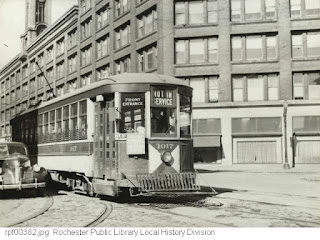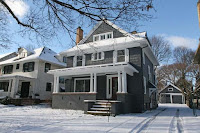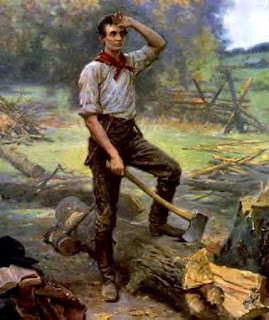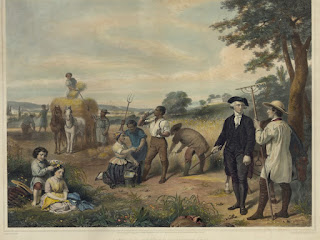The Ownership Society
I'm just going to start this one by saying that people roping off a section of the natural world and calling it "theirs", aka land ownership, on a society wide basis has proven to be, well, bad.
And now that half of you have angrily closed your browser, I'll be happy to explain what I mean to a sympathetic, or at the very least, an intellectually curious audience.
A Brief History of Land Use in America
If we go back into the mists of time, the idea that you have to pay money, or work for a lord and give him some portion of your produce to live isn't exactly new. Any sufficiently advanced society has some form of money, some form of landlord-tenant relationship. It certainly existed in Roman times, and even in some Native Americans tribes, like the Aztec.
The institution of land ownership is pretty similar everywhere, but it has shaped the United States in a pretty unique way. In the early days of colonial America, when native tribes were obliterated by disease and European conquest, new land was pretty much free for the taking for "regular folk" for the first time since the first Americans crossed the Bering Strait. A farmer had a couple of options, to live and work on a farm owned by someone who came to the country and took the land 20 years earlier, or they could venture out on their own, make a little log cabin homestead, and be his own man in the Jeffersonian vision.The story of American expansion west is one we all learn in school. The Louisiana Purchase, the US-Mexican war, the Gold Rush, the Oregon Trail, the Homestead Act, and so on. Land that was expropriated from France or Spain or Mexico, which they previously expropriated from the Native tribes was grabbed up by anyone who got there first to put a stake in the ground. The native population as a matter of course were relocated to new reservations, "freeing" up ever more land for settling. Of course the ruggedly individualistic settler was always a myth of sorts. At the very least a farmer would need tools and seeds, many times financed by east-cost banks, and the point of farming in America was to sell produce on the growing global market, there never was a significant subsistence farming culture in the US.
By the end of the 19th century all the best land was owned. Turner's Frontier Thesis posited that America had then come to a turning point. Indeed, the focus in America shifted away from rural to cities. Reflected in demographics by 1920 most Americans lived in a city. With larger city populations there arose a greater demand for more government regulation of industry and labor relations. The citizenry demanded more public services, and welfare for the poor. Socialism and labor unions became a real force in American politics.
The trajectory of American politics would have been very different were it not for the two World Wars of the first half of the 20th century. After the first war, people in the US were spooked by the Russian Revolution and by socialism in their own country, in the United States there was growing labor unrest and the leaders of the nation decided that they must avoid a socialist revolution at any cost. One solution put forward was to encourage home ownership, the logic being that people invested in land would have more to lose, and also would-be revolutionaries would be spread out geographically, making labor organization more difficult. This wasn't the only reason, but it was a reason. There was also the idea that small towns were more morally virtuous, while cities invited sin, crime, gambling, and drug use. Getting away from the city was encouraged for "social hygeine". And lest we forget the racial element, in the early 20th century the Great Migration was in full swing. Millions of black people arrived in northern cities, where they would go to clubs, gambling parlors, and play sexually charged jazz music. But even with all the push factors, suburbanization might not have happened if technology didn't allow it. The new suburban pattern was made possible through the personal automobile, thanks to Henry Ford made affordable to the America's middle class.
Suburban growth paused during the Great Depression of the 30s, due to it being hard to finance anything. But as part of the New Deal programs like Fannie Mae and the Federal Housing Administration were created which guaranteed mortgages, and encourage single family homes (usually for white people). After WWII, you get a lot the same social effects as after WWI, enmity with the Soviet Union, labor unrest, and rush to the suburbs driven by car ownership, but this time it gets cranked up to 11, and this time it sticks.
 |
| Home ownership rates in the United States since 1900 |
 |
| Aerial shot of Levittown, NY |
The last story of US housing is the Great Recession. Due to a systemic failure of banks, regulators, and ratings agencies, housing prices in the US dropped, banks lost a ton of money, and people were unable to pay back "subprime" mortgages. In this environment housing no longer looked like the sure bet for investment that people thought it was. Following the recession cities like New York and San Francisco recovered faster than the rest of the nation. People started to move back into cities for work, and also because of a general decrease in crime, which some attribute to less environmental lead. But the return to cities is also causing new problems. People are worried about being displaced through gentrification. Suburban developments built at the end of the last century and are getting old. Online shopping among other factors has led to "the death of retail". So malls and commercial strips across America are seeing less use, making many wonder, what do we do with suburban infrastructure once it becomes obsolete.
A Brief History of Rochester
Rochester was built on land originally belonging to the Seneca tribe of
the Iroquois Federation. After the Revolutionary War the Iroquois fell apart and with a series of land deals starting with the Phelps-Gorham
Purchase in 1788 and ending with the Treaty of Big Tree in 1797, the Seneca sold the
right to much of the land in Upstate New York around Rochester save for
a few small reservations.
 |
| A trolley in Rochester |
 |
| The Wilder Building, built 1888, one of the earliest skyscrapers |
But since the 50s population in the city has declined. Several buildings
in the city were destroyed to accommodate parking, and the Inner Loop
was constructed around the center city. This urban highway demolished
city blocks and paved over city parks, which currently sit deserted
they're hard to access and unpleasant to be in with the noise of car
traffic. As people moved out, so did business. The downtown department stores like Sibley's, and Midtown Plaza started to fail, and eventually closed Over the past 70 years the population has gradually spread out to first and second ring suburbs. At it's peak concentration in the 1920s Rochester accounted for 84% of Monroe County's population, today that figure is only 27%. While there are indications that this trend has slowed, it hasn't stopped.
What's so good about home ownership?
At least since Jefferson there has been a strain in American thinking that people who owned land in a community were more invested in it, and their values should matter more than people who merely rented where they lived, who were supposed to have a transient interest in a place. I disagree with that idea, which smacks of elitism. The property requirement to vote was dropped very early on in US history for good reason, the interests of property owners don't necessarily align with what's best for everybody. There's no evidence that Americans are better citizens today than they were in the first half of the 20th century when home ownership was less common. I'd also argue that some incentives of home ownership wind up being antithetical to a liberal democracy. White flight, based on the fear that black people moving into a neighborhood will lower property values. Anxiety over property values is a pressure point bad actors in politics can use to manipulate people into doing something they wouldn't otherwise.In the spirit of fairness, there are some good incentives associated with home ownership that revolve around keeping a neighborhood safe and clean. And often times, the stereotypical "NIMBY" homeowner doesn't stand to gain financially by opposing upzoning. Upzoning allows more uses for a specific plot of land, greater options would increase its value. Their objections center more on degradation of their environment, which I must emphasize is a valid concern. More people means more traffic, which means more noise, less safe streets, parking is harder to find and it takes longer to get where you want to go. This neighborhood concern is a bit of a double edge since it also encourages policing of non-conformities that don't negatively impact health and safety, hence overbearing zoning codes. Despite zoning, home ownership offers a much greater level of control over one's environment than renting does.
Talk about the values instilled by home ownership, or the freedoms it affords, misses the point. The real benefit offered by home ownership is financial. A renter may spend 30% (often more) of their income on rent every month. Home ownership means that money stays with them instead of going to a landlord. But a shift from renting to buying doesn't mean our former renter will suddenly have 30% of their paycheck as discretionary spending. They will have property taxes, insurance, utilities, home maintenance costs, and mortgage payments. It is true that mortgaging lets them build equity, and that's something you don't get from renting. Often, it is financially beneficial in the long run to own rather than rent. However, imagine we lived in a world where the price paid in rent was equivalent to what was spent on taxes and maintenance, then the money you had left over from renting could be invested in any asset, not just the house being bought.
If rent was equivalent to the collective costs of property ownership, then owning property would just be another investment vehicle like a CD, or IRA, or riskier investments like stocks or fine art. Like stocks, investing in property is a gamble that the value of the property will increase. Historically, property has been a pretty good investment vehicle. As Mark Twain once said, "Buy land, they're not making any more of it." But as we have seen in 2008, property values don't always increase year over year. If the value of the house decreases too much then a house can't be sold to pay off the mortgage. Luckily, government does absolutely everything in its power to prop up the housing market.
It's of absolute political necessity that property values increase because it's the most valuable things that the average American owns. If they lose their property they lose everything they've worked for. And if this happens to a lot of people all at once then it could destroy the whole economy for a generation. But there's a fundamental contradiction with using housing a one's primary means of building wealth: housing values can't increase faster than wages forever. So the government has to work harder and spend more to boost demand for housing each generation, just to make sure sure new families can afford houses, and these houses aren't allowed to decrease in price in an increasingly ridiculous web of subsidies, grants, and tax breaks.
I've mentioned the government guaranteeing mortgages through Fannie Mae, but it does a lot more to prop up suburban home value. There's the mortgage interest deduction, allowing you to deduct interest you pay on housing from your taxes. There's exempting property from capital gains. The Federal Reserve started buying up mortgages from banks during the 2008 recession, and it still holds about $2 trillion in mortgage backed securities. There's programs like STAR in New York that refund a portion of property taxes. There are grants by the city of Rochester that assist new home owners. I could go on, but this blog post is already getting long.
So owning as opposed to renting a house is generally a good deal because housing prices generally go up, though this is far from a "law of the universe". It's a good deal because there's a lot of government programs that go into supporting it. But the fundamental "good deal" of home ownership is that there is typically a difference between what you would pay in rent and what owning and maintaining a property outright would cost. That difference, which I'll call the "owner's take", is the true benefit of home ownership, especially if you don't value the greater control ownership affords.
The Owner's Take
 |
| A house in Rochester |
I'd like to pry a little into where the "owner's take" comes from. The value of any given place comes from three places:
- what's inherent to the property
- what's built on the property
- what's around the property.
Things inherent to a property would be things like climate, soil fertility, natural resources like ore or oil, or whether it's prone to flooding. Some of these factors matter more in the urban context, but what should be noted is that this value isn't created by the owner of the land, but the owner is able to profit off these factors while excluding others from them.
Value from things built on the property might be floor space, a nice kitchen, a hot water heater, plumbing and so on. These amenities are subject to supply and demand, things that are "worth it" will be added, the value of the amenities is equivalent to their maintenance, as things that cost more to maintain than they bring in with greater rent aren't worth providing.
 |
| A house in the wilderness |
Often the value of a place has more to do with what is around the property (Location, location, location!). A house on a paved road, with ways to access electricity, internet, clean water, and gas is way more valuable than if that same house were located in the mountain wilderness miles away from the nearest human being. The value also comes from proximity to other locations school districts, recreational facilities, friends, restaurants, and shopping, for example. This location value might also come from natural features, a like great view, or living near the ocean.
The point is that a person will rent a place based on all features of the property, (supply of alternatives also plays a role) but the owner only has to pay for what's built on the property, plus some amount in taxes. So the "owner's take" is the difference between the combined value of the property to a prospective renter and the general cost of maintenance of the built structure, equivalently it's the value inherent to the property and the value of being close to things near that property. So if the "owner's take" isn't created by the owner of a property, why should the owner be entitled to it?
What if we went the other way. Instead of using so much of society's resources trying to give more people this "owner's take", what if it was redirected away from the owner and put to public use, or redistributed back in an equal share to everyone? This is the essence of an economic idea championed by 19th century American economist Henry George and his idea for a land value tax. I'll explore more on this idea in another post.







Comments
Post a Comment